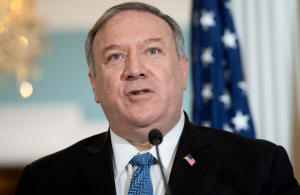Pompeo angers China with Hong Kong sanctions threat
 Send a link to a friend
Send a link to a friend
 [January 07, 2021]
By David Brunnstrom and Gabriel Crossley [January 07, 2021]
By David Brunnstrom and Gabriel Crossley
WASHINGTON/BEIJING (Reuters) - Washington
may sanction those involved in the arrest of over 50 people in Hong Kong
and will send the U.S. ambassador to the United Nations to visit Taiwan,
Secretary of State Mike Pompeo said, drawing anger and the threat of
retaliation from Beijing.
Pompeo said he was also "appalled" by the arrest of an American citizen
as part of Wednesday's crackdown and added: "The United States will not
tolerate the arbitrary detention or harassment of U.S. citizens."
Hong Kong police arrested 53 people in dawn raids on democracy activists
on Wednesday in the biggest crackdown since China last year imposed a
security law, which opponents say is aimed at quashing dissent in the
former British colony.

Among those detained was American lawyer John Clancey, a source at his
firm said.
Pompeo called the arrests an "outrage and a reminder of the Chinese
Communist Party's contempt for its own people and the rule of law."
"The United States will consider sanctions and other restrictions on any
and all individuals and entities involved in executing this assault on
the Hong Kong people," Pompeo said.
He said it would also "explore restrictions against the Hong Kong
Economic and Trade Office in the United States, and take additional
immediate actions against officials who have undermined Hong Kong's
democratic processes."
Further riling Beijing, Pompeo announced in the same statement Kelly
Craft, Washington's U.N. ambassador, would visit Chinese-claimed and
democratically run Taiwan, a highly symbolic trip as the island is not a
U.N. member due to the objections of Beijing, which views Taiwan as a
wayward province.
"Taiwan shows what a free China could achieve," he said.
Chinese Foreign Ministry spokeswoman Hua Chunying said Pompeo's comments
represented a serious interference in the country's internal affairs,
which China strongly condemned.
"China will take all necessary steps to resolutely safeguard its
sovereignty and security interests," Hua told reporters. "The United
States must pay a heavy price for its mistakes."
Taiwan's Foreign Ministry welcomed Craft's visit, which will be the
first of a sitting U.S. ambassador at the U.N. to the island, saying it
demonstrates the strong U.S. support for Taiwan's international
participation.
[to top of second column]
|

U.S. Secretary of State Mike Pompeo speaks to the media in
Washington, D.C., U.S., November 24, 2020. Saul Loeb/Pool via
REUTERS/File Photo

DAY OF TURMOIL
Pompeo's statement came after a day of turmoil in Washington that
saw supporters of President Donald Trump storm the Capitol in a bid
to overturn his November election defeat.
Lawmakers on both sides denounced the gravest assault on the two
houses of Congress in more than 200 years, calling it an
embarrassment to American democracy that would play into the hands
of rivals like China.
"I think they're high-fiving in Beijing, and the Chinese look at
this and are very happy about it," Republican Senator Marco Rubio, a
China hawk, told Tucker Carlson on the Fox News channel. "It kind of
bolsters their claim that we're falling apart and they're the
country of the future."
On Wednesday, the Chinese embassy in Washington issued an advisory
on its website, warning Chinese citizens to strengthen safety
precautions in light of the "large-scale demonstration" in
Washington and the curfew announced by the local government.
Trump has pursued hardline policies towards China on issues from
trade to espionage and the coronavirus. His administration has
imposed sanctions on Chinese officials for crushing Hong Kong's
pro-democracy movement and other alleged rights abuses.
Tensions have escalated within Washington on China policy in the
final days of the Trump administration before U.S. President-elect
Joe Biden takes office on Jan. 20.

The New York Stock Exchange said on Wednesday it would delist three
Chinese telecoms companies, while the administration is also
considering adding tech giants Alibaba and Tencent to a blacklist of
firms allegedly owned or controlled by the Chinese military.
(Reporting by David Brunnstrom and Gabriel Crossley; Additional
reporting by Vincent Lee in Beijing, Ben Blanchard in Taipei and
Kanishka Singh in Bengaluru; Editing by Kim Coghill, Raju
Gopalakrishnan and William Mallard)
[© 2021 Thomson Reuters. All rights
reserved.] Copyright 2021 Reuters. All rights reserved. This material may not be published,
broadcast, rewritten or redistributed.
Thompson Reuters is solely responsible for this content. |